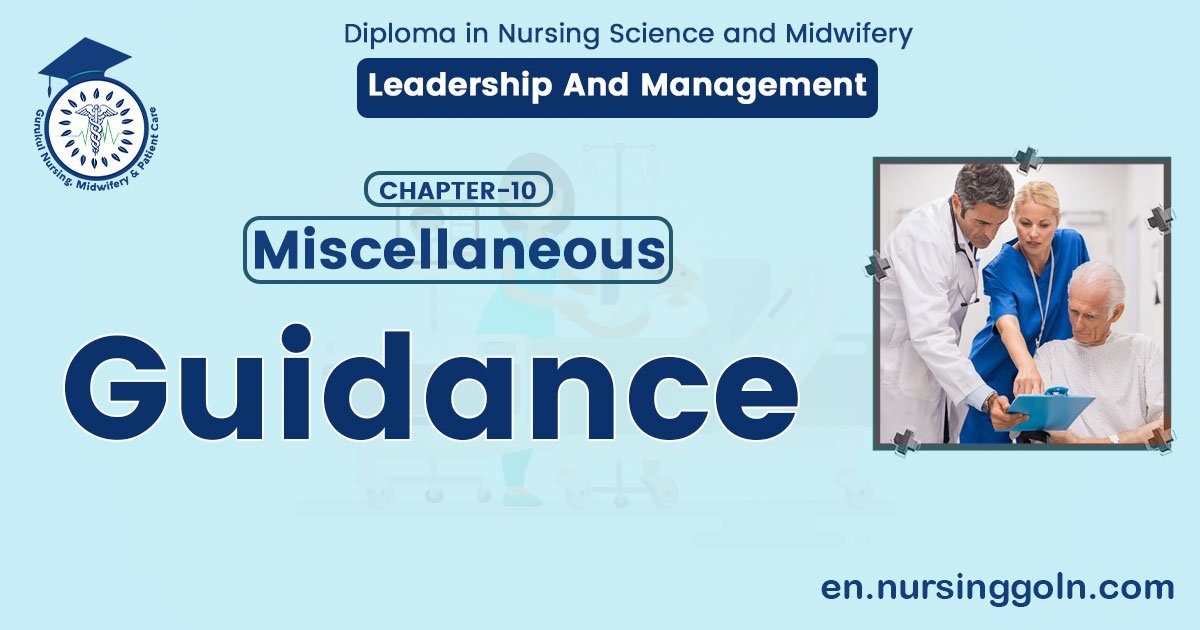Concept of Guidance – This book covers the entire syllabus of “Leadership & Management” prescribed by the BNMC for Diploma in Nursing Science & Midwifery Students.
We tried to accommodate latest information and topics. This book is an examination setup according to the teachers’ lectures and examination questions. At the end of the book previous university questions are given. We hope in touch with the pook students’ knowledge will be upgraded and flourished. The unique way of presentation may make your reading of the book a pleasurable experience.

Concept of Guidance
Guidance is all round assistance to individual in all aspect of his or her development. It makes use of the science of psychology to determine the attitude, interest, intelligence, personality and the discipline of the education for providing right and suitable assistance.
Definitions of Guidance
According to Brewer:
“Guidance is a process through which an individual is able to solve their problems and pursue a path suited to their abilities and aspirations”.
According to Mc Baniel:
“Guidance is a facilitative service, which provide aids to pupils and staff’
- To help pupils determine the courses most appropriate to their needs and abilities
- To find instructors who will be more sympathetic to their individual requirements and seek out activities which will help them to realize their presentation”
According to Hamrin and Erikson:
“Guidance is an aspect of educational programme which is concerned especially with helping the pupil to become adjusted to her present situation and to plan his future in line with her interests, abilities and social needs”.
According to Shertzer and Stone:
“Guidance is the process of helping individuals to understand themselves and their world”
(Ref by-Promilaa/1/73)
Characteristic of Guidance:
- It is a process of helping or assisting an individual to solve their problems. It help them to identify where to go, what to do and how to do for post accomplishment of their goals.
- It is a continuous process which start right from childhood, adolescence and continues over in old age.
- It is assistance to the individual in the process of development rather than direction of that development.
- It is a service meant for all: its regular service that is required for every student, not only for abnormal students.
- Guidance is an organized service not in incidental activity of the school.
- Guidance is more an art than science.
- Guidance is centered on the needs and aspiration of students.

Principles of Guidance:
According to Crow and Crow there are 14 significant principles for guidance they are
1. Every aspect of person’s complex personality pattern constitutes a significant factor of his total displayed attitudes and form of behavior. Guidance service which are aimed at bringing about desirable adjustments in any particular area of experience must take in to account, the all round development of the individual.
2. Although all human beings are similar in many respect, individual difference must be recognized and considered in any effort aimed at providing help or guidance to a particular child.
3. The functions of the guidance is to help a person
- Formulate and accept stimulating, worthwhile and attainable goals of behavior
- Apply the goals to conduct his behavior.
4. Existing social, economic and politic unrest is giving rise to many maladaptive factors that require the cooperation of experienced and thoroughly trained guidance workers and the individuals with the problem.
5. Guidance should be regarded as a continuing process of service to an individual from young childhood through adulthood.
6. Guidance service should not be limited to the few who give observable evidence of its need, but should be extended to the all person of all ages who can benefit there from either directly or indirectly.
7. Curriculum materials and teaching procedure should evidence a guidance point of view.
8. Parents and teachers have guidance appointed responsibilities,
9. To administer guidance intelligently and with as thorough knowledge of the individual as is possible, programs of individual evaluation should be conducted and accurate consultative records of progress should made accessible to guidance workers.
10. An organized guidance programme should be flexible according to the individual and social needs.
11. The responsibilities for administration of guidance programme should be centered in a personally qualified and adequately trained person, working cooperatively with his- assistance and other community welfare and guidance agencies.
12. Periodical appraisal should be made for existing guidance programmes.
13. Guidance touches every phase of an individual’s life pattern.
14. Specific guidance problems on any age level should be referred to persons who are trained to deal with particular areas of adjustment.
Functions of Guidance and Counseling:
Guidance and counseling have three-fold functions namely adjust-mental, orientational and development.
| Adjustmental: | They help the student in making the best possible adjustment to the current situation in the educational institution in the home and the community. It enables the student to accept the things which they cannot change in life and differentiate what they can change and cannot change in life. |
| Orientational: | They orient the student in the problem of cancer planning, educational programming and direction towards long term personal aims and values. |
| Developmental: | It is concerned with helping the people to achieve self-development and self- realization. |
(Ref by-Promilaa/1/76)
Need of Guidance and Counseling
- The need for guidance and counseling can be summarize as
- To help is the total development of the students.
- To arise students in leading a healthy life by abstaining from whatever is deterious to health.
- To help the proper selection of educational programme.
- To select career according to their interest and abilities
- To help students in vocational development.
- To develop readiness for change and to face challenges.
- To help fresher’s to establish proper written.
- To identify and motivate students of the weaker society.
- To help the students to overcome the period of turmoil and confusions.
- Ensure proper utilization of time-spend outside the class.
- To help in tackling problems arising out of student exploration and co-education,
- To minimize the indiscipline.
- To motivate youth for self-employment.
Difference between guidance and counseling
| Guidance | Counseling |
| Guidance is mainly preventive and developmental | Counseling is remedial as well as preventive and developmental. |
| Intellectual attitudes are the raw material of guidance | But emotional rather than pure intellectual attitude are the raw materials of counseling process. |
| In guidance decision making operable at intellectual level | Counseling it operate at emotional level. |
Purposes of Guidance and Counseling:
According to Dunsmoor and Miller, the purpose of guidance & counseling are-
1. To give the student information on matters important to success.
2. To get information about student which will be of help in solving his problems.
3. To establish a feeling of mutual understanding between student and teacher.
4. To help the student work out a plan for solving his difficulties.
5. To help the student know himself better-his interests, abilities, aptitudes, and opportunities.
6. To encourage and develop special abilities and right attitudes.
7. To inspire successful endeavor toward attainment.
To assist the student in planning for educational and vocational choices.
Scope of Guidance & Counseling:
The dictionary meaning of the term scope implies area, jurisdiction, outlook, range of view, field or opportunity of activities, breadth, operation, application and subject matter. The scope of guidance is bound to be vast as it has a broader meaning and wider connotation.
The scope of guidance therefore implies the extent, length, breadth, range, comprehensiveness and variety of helping an individual to solve his problems. So the scope of guidance covers functionally all aspects of life Otherwise guidance will be a baseless programme for the children seeking its help and it wills loss it’s identifying in the society.
The present contemporary society is becoming more and more complex day-by-day. As a result of this, the needs and problems of individuals are also increasing with the increasing complexity of the society. This situation heavily demands an organized programme of guidance.

Hence the scope of guidance & counseling covers:
- Types of Guidance, viz., personal guidance, educational guidance and vocational guidance. Guidance for adjustment of individual through socialized, curricular, co-curricular activities, community resources, vocational opportunities, group life, group contacts etc.
- Individual Guidance Service.
- Group Guidance Service.
- Devices for collection of data through testing and non-testing devices like achievement test, aptitude test, personality test, creativity test, intelligence test, attitude scale, interest inventory, interview schedule. Cumulative Record Card, observation, check list, rating scale and socio-metric techniques etc.
- Organization of guidance services.
- Counselling services or techniques.
- Role of different personnel involved in guidance and counselling service.
- Follow-up service in guidance.
Alter highlighting the elements of the scope of guidance it is essential to point out here that among these different elements the first element, type of guidance is regarded as the major aspect or element of guidance and the other aspects or elements although essential are subservient to the types of guidance.
To justify this, it can be emphasized here that the persons who have insightful knowledge about guidance, the scope of guidance for them means the types of guidance.
